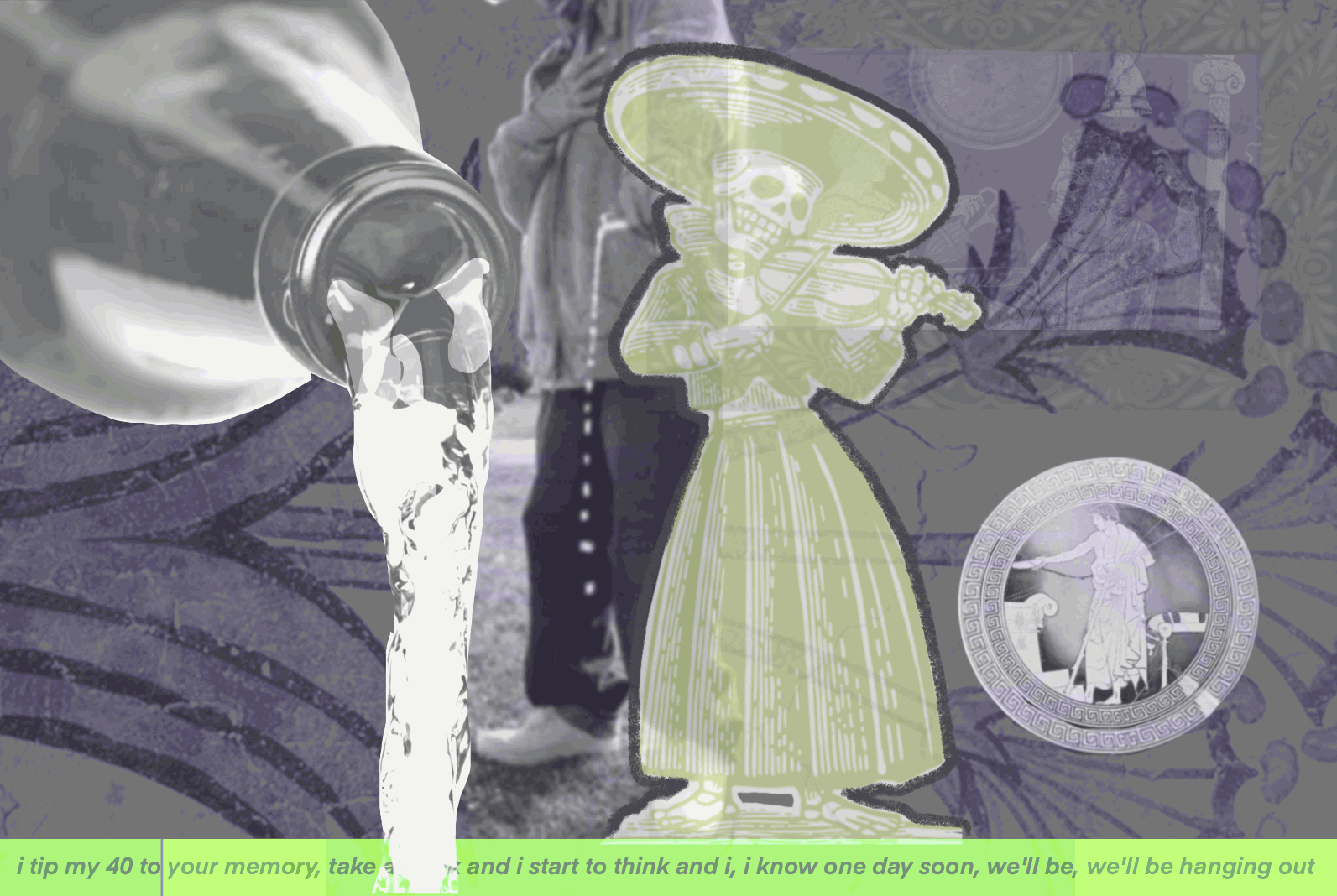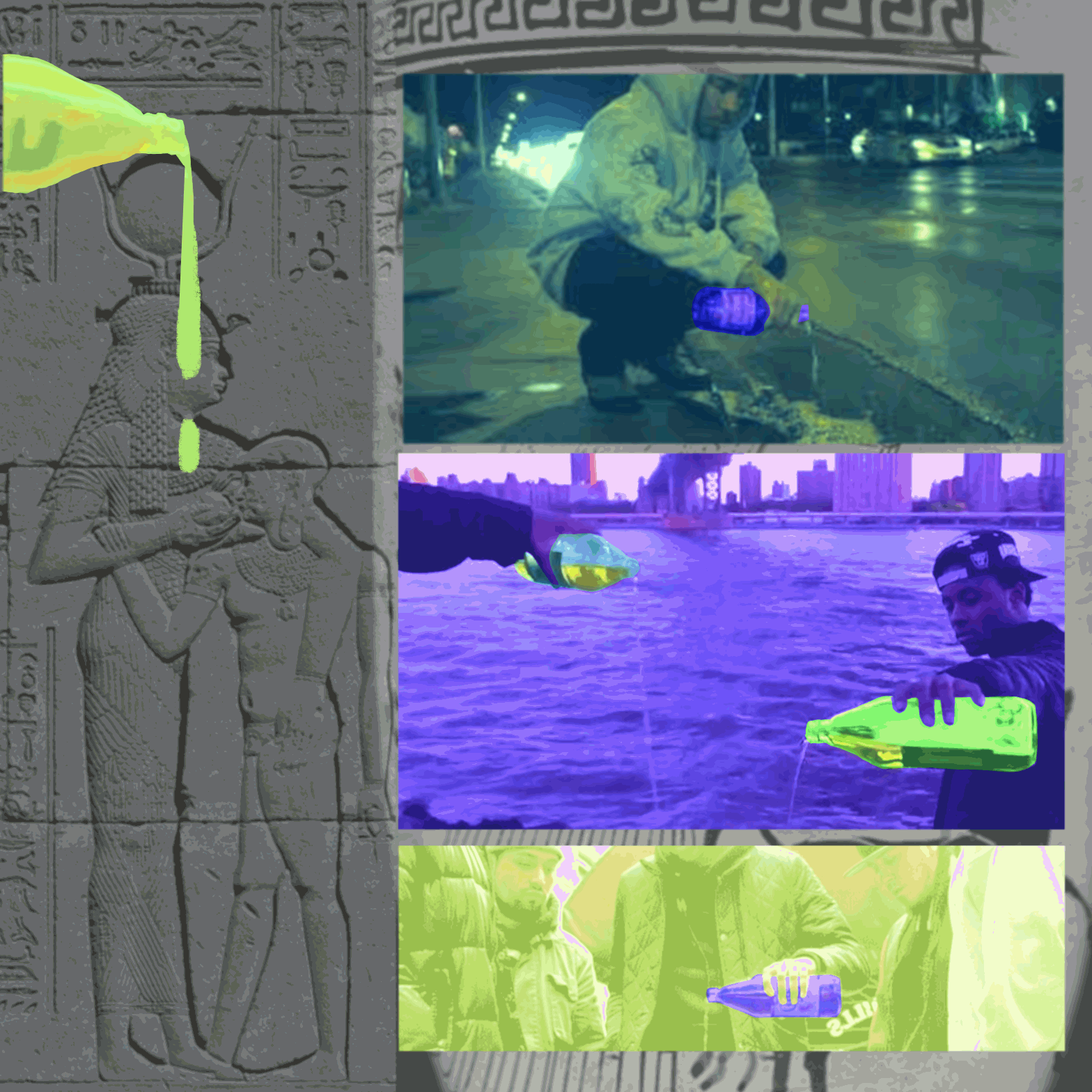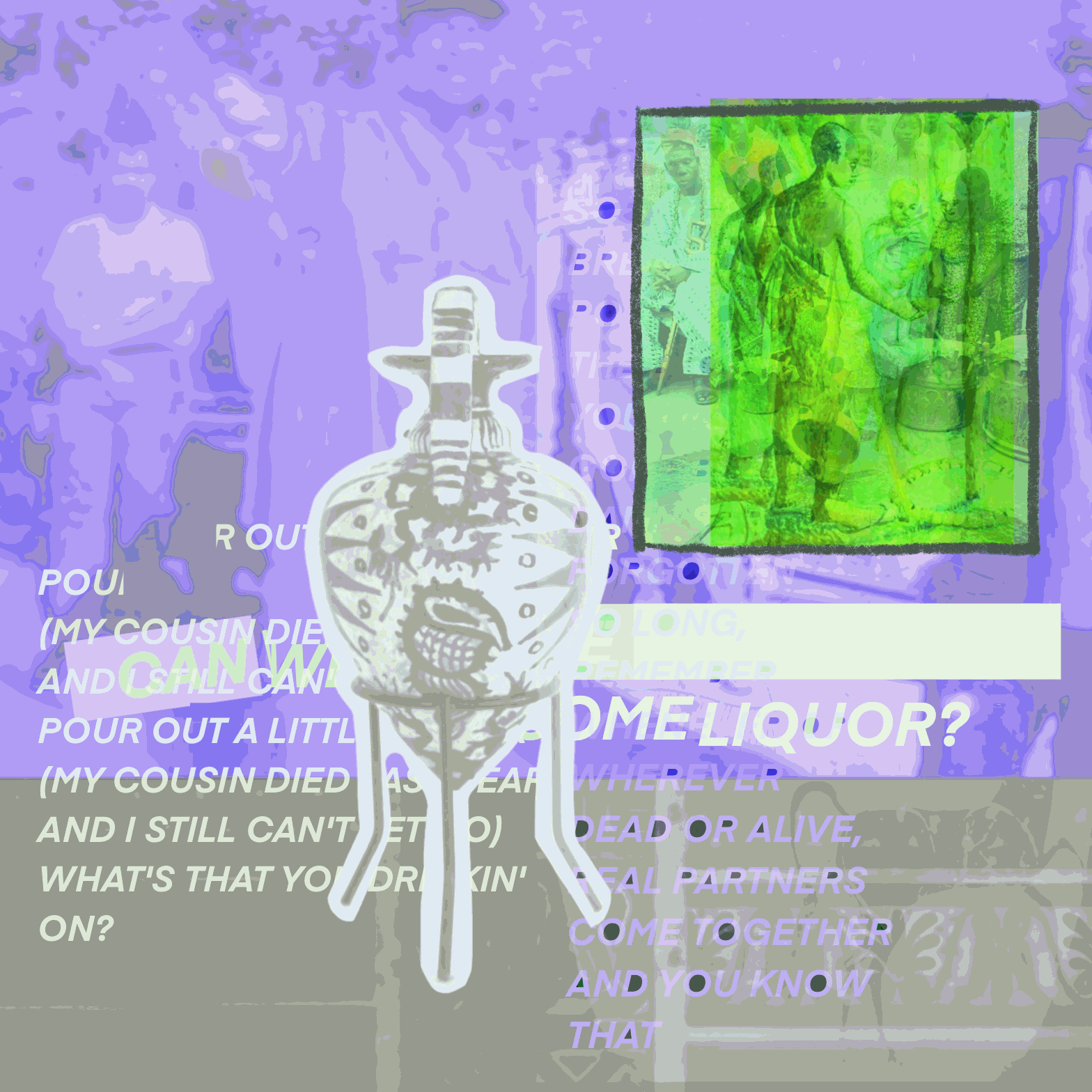When a loved one dies, we tell stories and drink in their honor.
An Irish wake is a celebration of the life of the departed, with memories shared over a whiskey or a pint of beer while the deceased lies in the same room. In Mexico, there’s Día de Muertos, or the Day of the Dead, where it’s believed that spirits walk among the living, prompting family members to build colorful altars called “ofrendas,” which are decorated with photos, food, and beverages to toast the spirits. Imbibing to commemorate the dead is a tradition that crosses generations and cultures.
If you were a hip-hop fan in the 1990s, you probably remember the act of artists “pouring one out” for a homie in various songs and movies. Doughboy, played by rapper-turned-actor Ice Cube, famously spilled some of his 40oz malt liquor on the ground to honor a dead friend in John Singleton’s 1991 film “Boyz n the Hood,” and this ritual was referred to in 2Pac’s 1994 song “Pour Out a Little Liquor” as well. When the song “Gangsta Lean” by D.R.S came out in 1993, the group poured some of their 40 to honor dead friends with the lyrics:
I tip my 40 to your memory
Take a drink, and I
Stop to think, and I
I know one day soon
We’ll be, We’ll be hangin’ out
“Pouring one out,” or “tipping,” is the modern version of the ancient ritual known as “libations.” More than just a fancy word writers use to gloss up articles about drinking, the act of libation is one of the oldest known human customs—one that dates back to antiquity, when people poured liquid on the ground (or grave) in memory of their heroes, gods, and dead family members.
The act is universal, spanning centuries and continents, and today it holds a particularly meaningful place in Black culture in the United States. When enacted in both the hushed privacy of personal moments and memorialized on screens and stereos via pop culture, pouring one out helps Black people stay connected with our roots.
“[Libations are] rampant in contemporary societies all around the world,” says Lucas Livingston, an ancient beer and art historian on the board of directors for Chicago’s Beer Culture Center. “Going back to ancient Egypt and Mesopotamia, the dawn of civilization, basically, as soon as people had alcohol, and even before then, they were already pouring it out in honor of divinities or ancestors.”
The first known reference to libations can be traced back to the ancient Egyptians, who instead of alcohol used water—usually from the Nile, because the river was understood as symbolic of life and death. But alcohol, honey, milk, and other liquids were also common. In many cases, the liquid would cascade into a “libation bowl” placed on a designated altar or table. This act is even recorded in the Bible; in Genesis 35:14, Jacob set up a stone pillar upon which he poured his drink and oil as an offering to God.
Other ancient cultures in Greece, China, and Italy had versions of the same ritual. In China, tea or rice wine was poured at the altar as a sacrifice for the dead and the gods, then dumped onto the ground. The Romans went one step further when they created libation tubes: made of wood, terracotta, or other sturdy materials, these were buried with one end inside the tomb so that the living could ferry liquids and solids into the grave, allowing the dead to consume nutritious goods from the other side of the veil.
“When enacted in both the hushed privacy of personal moments and memorialized on screens and stereos via pop culture, pouring one out helps Black people stay connected with our roots.”
African cultures had their own myriad of variations on the act. Even with colonization of the continent and the spread of Christianity, the ritual still thrives in its spiritual context across Africa today. The Akan People of Ghana, for example, have long used libations to call upon deities such as Kwame the Supreme Being and AsaaseYaa, the earth personified. In this case, it’s a religious act accompanied by music and dance. “Libation pouring has the function of welcoming God and the other spirits home into the human world,” Desmond Ayim-Aboagye, a professor of psychology and religion, writes in “Art, Music and Religious Experience in Libation Pouring of Akan Religion.” “The drink which is poured on the ground is meant to ‘cool down the throats’ of these deities and prepare them for a much more relaxed posture for hearing the petitions of human beings.”
In West African countries like Nigeria, among the Igbo people, libations are part of everyday life, enacted privately and publicly, led (only) by male elders as a spiritual communion between human, deity, and society. The ritual happens on many different occasions, including births, marriages, the naming of children, and other festivities. “The mood is usually solemn and the tone of the accompanying utterances is supplication, since it is an invocation of the supernatural (the supreme God, the personal gods, and ancestors) in the natural affairs of man,” writes scholar Kenneth Chukwu in his paper, “Igbo Traditional Libation and the Speech Act Performative.” “It is an occasion of spiritual communion that unites man and the other cosmic actors who, it is believed, play important roles in the harmony of ecological existence.”
Libations have also been kept alive among descendants of the African diaspora, especially in Black culture in the United States. During slavery, when it was illegal for Black people to read or write, most traditions, including libations, were passed down orally. Even as today’s members of the diaspora have been disconnected from aspects of their ancestral practices due to the period of enslavement and subsequent subjugation, the libation ritual survives. “It’s a preservation of tradition and a legacy of the palpable loss and abuse of the African peoples and the African descendants of the diaspora,” says Livingston. “[It is a] deeply impactful way of memorializing the scar.”
“Going back to ancient Egypt and Mesopotamia, the dawn of civilization, basically, as soon as people had alcohol, and even before then, they were already pouring it out in honor of divinities or ancestors.”
The tradition manifested prominently again in modern American Black culture during the 1990s—a time marked by a powerful resurgence of African identity and pride, when many people adopted an Afrocentric point of view in dress, food, and mindset. In a 1997 article in the Gadsden Times, history professor Camille Yarbrough put it pointedly when she told the journalist: “We are trying to recapture our story, and [libation] is part of the telling of our story…we are scattered around the world and we have been attracted to the motherland, to putting all the pieces back together.”
Cocktail historian and bar educator Tiffanie Barriere’s first memories of this tradition go back to the mid-90s as well, when gang violence and drug usage—plus the Rodney King beating by police that led to the Los Angeles Riots in 1992—meant death was rampant in Black communities across America. “Black men, women, and children were being killed on a daily basis, and it is very important in the Black community to share a sip for those missing,” she says. “It was like praying before eating.”
Around the same time, hip-hop was used as a mainstream vehicle to honor lives lost to senseless violence. Syreeta Gates, founder of The Gates Preserve and Yo Stay Hungry, organizations that build bridges between hip-hop and food and beverage, says the art of libation fused into hip-hop culture because it was already prevalent in Black culture, especially in the South. In many instances, artists didn’t refer to the ritual as “libations” specifically, even though the practice they’re referencing is clearly one and the same. For example, Ice Cube calls it “reminiscing” in the song “Dead Homies,” released in 1991:
I remember we painted our names on the wall for fun
Now it's "Rest in Peace" after every one
Except me, but I ain't the one to front
Seems like I'm viewin' a body after every month
Plus, I knew him when he was yea big
Pour beer on the curb before I take a swig
“Black men, women, and children were being killed on a daily basis, and it is very important in the Black community to share a sip for those missing. It was like praying before eating.”
In the 1994 song “Pour Out a Little Liquor,” 2Pac pays homage to friends that are “dead and gone,” not naming the ritual at all but instead using repetition of the song title throughout to emphasize its importance.
Pour out a little liquor
(My cousin died last year and I still can't let go)
Pour out a little liquor
(My cousin died last year and I still can't let go)
What's that you drinkin' on?
Hip-hop’s embrace of libations allowed Black communities around the US to have a modern version of this ancient ritual. “I think hip-hop just popularized [libations] in a way where we were given the language to talk about the celebrations of life that maybe we didn’t have before,” says Gates. “It’s not specific to a particular generation—hip-hop only happened 50 years ago, while we’ve been in this country for centuries,” she adds.
In some ways, the genre transformed the ritual from a private and personal thing to an act so popular it eventually became removed from its roots—eventually, people everywhere, and especially in the African-American community, would pour one out for their homies without knowing they’re performing an old boozy ritual with roots that go back several thousands of years.
In his 2004 track “Just a Moment,” the rapper Nas calls it a symbolic gesture:
Can we please pour out some liquor?
Symobolizin', let's take in time to consider that
Though our thugs ain't here, the love is here
And we gon' rep 'til slugs kill us here
Today, there’s no right or wrong way of celebrating libations. Black people are not monolithic, so in many cases the way drinks get poured out comes down to where you grew up. “With the Great Migration, it looks different in different parts of the States,” says Gates. “Libations in the South might look completely different than how we do it in New York, which might be different than how to do it in New Orleans, which might look completely different than how to do it in Chicago.”
And its meaning has deepened and evolved further as more Black people are getting back in touch with their African roots for cultural preservation and continuity.
“I think a lot of folks are going back to Indigenous practice, like Yoruba culture or Haitian Vodou, where giving libations is compulsory,’ says Erica Xavier-Beauvoir, a death doula who helps people and their families through the emotional and spiritual process of dying. “I’m not going to say it’s a mass exodus, but some people are returning to the ways of their ancestors. And now people can put the verbiage as to why we are pouring libations—why we are giving back to the soil that houses our ancestors.”
The libation practice reflects the principle that ancestors deserve to be honored. It can reinforce culture, offer empowerment, and reflect the transformative aspects of African heritage. And these days, many Black people are alchemizing the practice to celebrate life and new beginnings, too.
Kim Kirkley, the wedding officiant, life-cycle celebrant, and founder of Our Elegant Ceremony, incorporates libation ceremonies at weddings. “We did not raise ourselves and as is often said in Black culture, ‘we stand on our ancestors’ shoulders,’” she says. “There is a drive for cultural preservation and continuity. The libation practice is a simple way to honor those who came before us and the culture which sustains us.”
According to Kirkley, this ritual is increasingly commonplace at other family occasions like reunions, christenings, and at black-tie events like film premieres. “The December holiday Kwanzaa includes a libation every day during the seven-day celebration, many Black History Month events include libations, and some African-American church services include libations,” she says.
Deniseea Head, a cocktail consultant and historian based in New Orleans, incorporated libations into her recent wedding. “It was a way for us to celebrate our union, but also honor loved ones that weren't able to physically be with us during the special moment,” she says. “It was also a way for us to pay homage to New Orleans and its drinking culture. We really wanted this moment to make it clear that our love was a celebration from beginning to end.”
“There is a drive for cultural preservation and continuity. The libation practice is a simple way to honor those who came before us and the culture that sustains us.”
It’s funny that the African-American community has been performing an old boozy ritual with roots going back several thousands of years and spanning across various ancient cultures for so long, while largely not knowing its history or origins. But its resurgence and reclamation today proves the perseverance of Black people—no matter what is going on in the world, old traditions never truly die out. Instead, they morph into a new form, over which the whole culture can unite.
It’s like Geto Boys say in Six Feet Deep:
So when I drink a brew for you I pour some on the block, son
You might be gone but you damn sure ain't forgotten
So long, remember whenever or wherever
Dead or alive, real partners come together
And you know that












